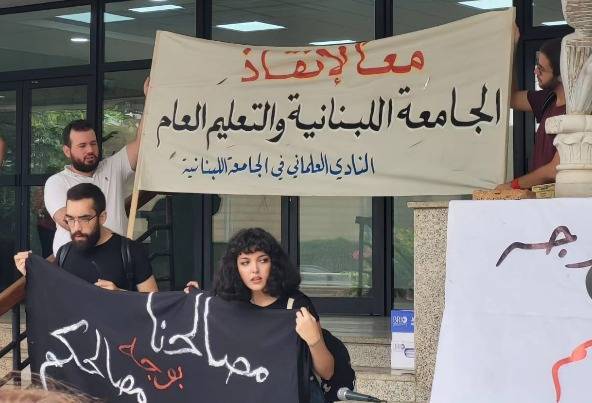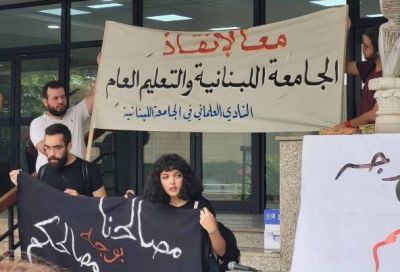
Lebanese University students demonstrate against the increase in tuition fees in Beirut, Aug. 17, 2023. (Credit: NNA)
With Lebanese University facing major challenges in the context of the current crisis, university president Bassam Badran said, it has been decided to substantially increase student tuition fees.
Badran told L'Orient-Le Jour that tuition fees in Lebanon's only publicly funded higher education institution will be LL12-13 million a year (around $140, at the parallel market rate of Saturday, Aug. 19) for Lebanese and Palestinian students at the bachelor level (compared to LL885,000 in 2022), and LL17-18 million (around $190) for students at the masters level (compared to LL 2,085,000 previously), and close to LL22 million (nearly $250 dollars) for Ph.D students (compared with LL6,585,000).
"Tuition fees will be higher for foreign students," he added, "reaching LL300 million (over $3,300) for Ph.D students.
"We cannot allow Lebanese University (LU) to close its doors. We had to raise tuition fees to ensure its continuity," Badran added, saying that current challenges include salary adjustments, logistical and technical maintenance and maintaining teaching quality.
While the LU president acknowledged that students "should not take responsibility for the situation in which the university finds itself," he believed that they can help "protect" the institution.
LU's demands
This tuition increase will avoid a faculty strike and logistical problems at the start of the new academic year, Badran said. "It's unacceptable that a professor, who earned around $4,000 per month before the crisis, is currently paid $200," he added, calling for the government to "ensure a budget that meets LU's needs."
He called for a budget of at least LL4,000 billion (compared to LL860 billion previously), financial support for professors and civil servants, the possibility of tenure for professors and the granting of permanent status for contract staff.
"We are faced with two choices," the President warned, "solve the problems or let the university collapse."
Students divided
On the student side, the increase in tuition fees does not meet with unanimous approval.
Dozens of students, including members of LU's secular club, demonstrated in front of the university's head office in Beirut Thursday.
Speaking on behalf of her fellow students, Zahraa Nemer deplored the fee increase, assuring the public that she would continue to "fight for public education accessible to all."
Rowan Ibrahim, a student in her first year of a master's degree in law, told L'Orient-Le Jour that she wasn't surprised by the increase in tuition fees, but found the decision "insolent."
She believed that the university has "other sources of funding to counter its deficit."
Karim Safieddine, coordinator of the Mada network, whose members took part in Thursday's sit-in, agreed. "Students must not pay the price for the collapse," he said, saying he believed the university's deficit can be resolved via other funds collected by LU.
Other students feel that the increase in tuition fees is reasonable, even a necessary step in the university's recovery.
Randa al-Hachem, an MA student in French and comparative literature at Dekouaneh, told L'Orient-Le Jour the increase in fees is "fair."
"Spread over the nine months of the academic year, the new fees are between $16 and $23 per month, which I think is still a reasonable amount to earn a degree from a respected university."
"However, this money should not be stolen by the state," she added, "but used to pay professors who deserve a salary increase,"
Michael Chaiban, a third-year medical student, agreed.
"Last year, the fees amounted to what is now the equivalent of $10, which is a minimal amount compared to what we learn," he said. "Campuses need maintenance and teachers need to be paid more."
